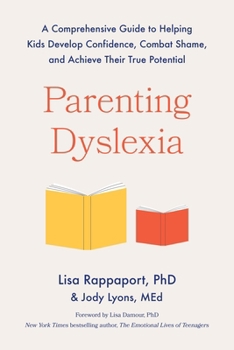Parenting Dyslexia: A Comprehensive Guide to Helping Kids Develop Confidence, Combat Shame, and Achieve Their True Potential
It is estimated that fifteen million children in the United States are dyslexic which can often be a major challenge not only for the kids, but also for their parents, families, teachers, tutors, and therapists. And yet, dyslexia doesn't have to be a disadvantage for kids--if the right tools are available. Parenting Dyslexia fills this critical need, providing prescriptive advice and concrete tips to drive educational and personal growth without any associated stigma. An easy-to-use, comprehensive reference book for anyone caring for a dyslexic child to use at all stages of development, Parenting Dyslexia effectively anticipates and addresses the psychosocial and academic issues that dyslexic learners are likely to face at different stages, including:
Cultivating varied skills to balance out classic deficits. Developing effective self-esteem and academic habits to help overcome age-specific hurdles. Establishing individual and family practices to prevent a child's feelings of isolation, anxiety, and depression. Survival tools to navigate the predictable challenges a dyslexic learner will likely encounter. Nurturing independence as well as a child's ability to ask for help and become a strong self-advocate.The book provides an accessible roadmap of how to: Move through the major hurdles of dyslexia. Reassure children that not only can they survive dyslexia, but they can thrive using sound psychosocial and academic practices. Avoid typical pitfalls of a well-intentioned campaign to push a child to succeed that can lead to frustration and resistance. Unite family members to be part of the family "team" to supply special support for their dyslexic learner. Create an atmosphere of fun and humor to help everybody maintain perspective during stressful moments.
Dr. Rappaport is not only an authority on the subject, but she also happens to be dyslexic herself. From her unique vantage point, she provides a relatable, sympathetic, and optimistic voice of personal experience to this sensitive topic. Grounded in science but written in non-technical language, Parenting Dyslexia offers a wealth of tried-and-true methods for supporting dyslexic learners of all ages.





